DJ JaBig Is Exploring How Far a Bike Can Take Him and Raising Money for World Bicycle Relief Along the Way
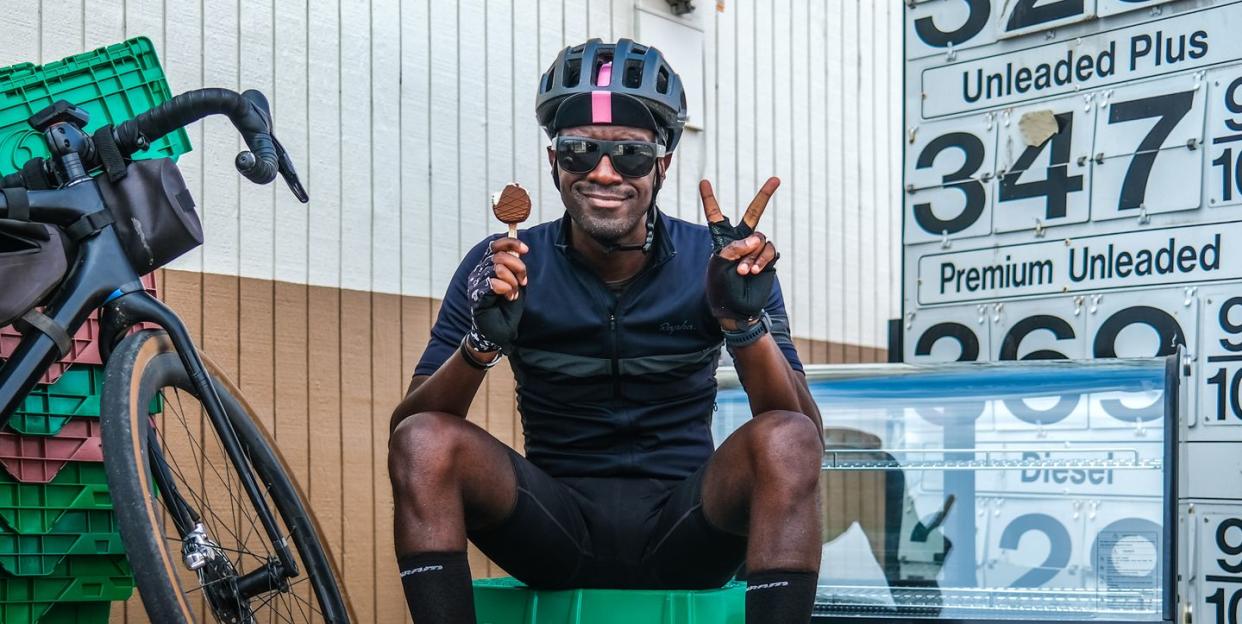
You may not expect a DJ to be an avid cyclist, but JaBig is, and well, he’s big on defying expectations. His cycling palmares are matched by his prowess as a DJ: He’s pedaled across Canada and around the U.S., covering thousands of miles, and people have streamed more than 7 billion hours of his mixes across platforms.
JaBig’s miles have included his first bikepacking trip, a casual coast-to-coast-to-coast ride across Canada in 2017 on a fixed gear bike... in the winter. Ironically, despite spending most of his adult life in Montreal, he really hates the cold.
If it hadn’t been for an Australian out for a long ride at the same time as JaBig, that Canada trip would have put him in the Guinness Book of World Records for the longest ride in one country. But that wasn’t why he did it. “I’m the first known person to ride across Canada on a fixed gear bike coast to coast to coast. That alone is something unique. But I wasn’t done,” he says. “One of the things that caught people’s imagination with the trip was that I look different. I’m this immigrant here, and I pulled this trip off. That made other immigrants to Canada go, ‘Maybe we can do this too.’”
Most recently, JaBig returned from another long trip riding around the U.S. to raise money and awareness for World Bicycling Relief, a cause close to his heart. Born in Rwanda, he’s seen firsthand how a bicycle in rural Africa can change a person’s life, so he’s riding to get more people on bikes.
The accidental cyclist
JaBig was a DJ long before he was a cyclist. Living in Montreal and growing his fanbase, it never occurred to him that cycling was an option—until a friend needed to borrow his beloved Mini Cooper for a day. He dropped it off at her work, and then realized he needed to get himself back home. So, he started walking and went right past a bike shop.
“I said, ‘Oh, you know, maybe I should buy myself a bicycle.’ That shop sold fixed gear bikes, which I didn’t understand,” he laughs. “They let me test one, and I immediately fell off because I tried to stop but the pedals kept going. But I liked the feeling of it, so I bought it. And because my friend had my car for the week, I just started riding everywhere. That’s how it started. That summer, I rode my bike everywhere, because as a DJ, I only work Thursday, Friday, and Saturday. When I started riding, I felt good physically and mentally.”
His distances started adding up—he’d often get so far afield of Montreal he’d have to call friends for pickups because he’d realize it was dark and he didn’t have lights. Then friends told him about Strava. He started logging his kilometers, and they stacked up fast—so quickly, in fact, that when he saw his yearly mileage, he realized his jaunts around Quebec could have taken him much further.
The idea to cross Canada by bike started to brew in his mind, and then, he thought about adding another challenge: Canada has three coasts, why not ride to them all? It was only a matter of time before he decided to try bikepacking and ride around Canada. He needed a change, after spending 20 years as a professional DJ and feeling a bit stuck, so taking a winter break to clear his mind made sense.
That said, JaBig is quick to point out that he is not a camping-style bikepacker. “When I started that ride, I was learning on the job,” he says. “I knew I wasn’t going to try the camping thing, I would just stay with people. Camping would have added a whole new element to it, and would have meant I had to carry all that weight on a fixed gear bike.”
The power of a bicycle
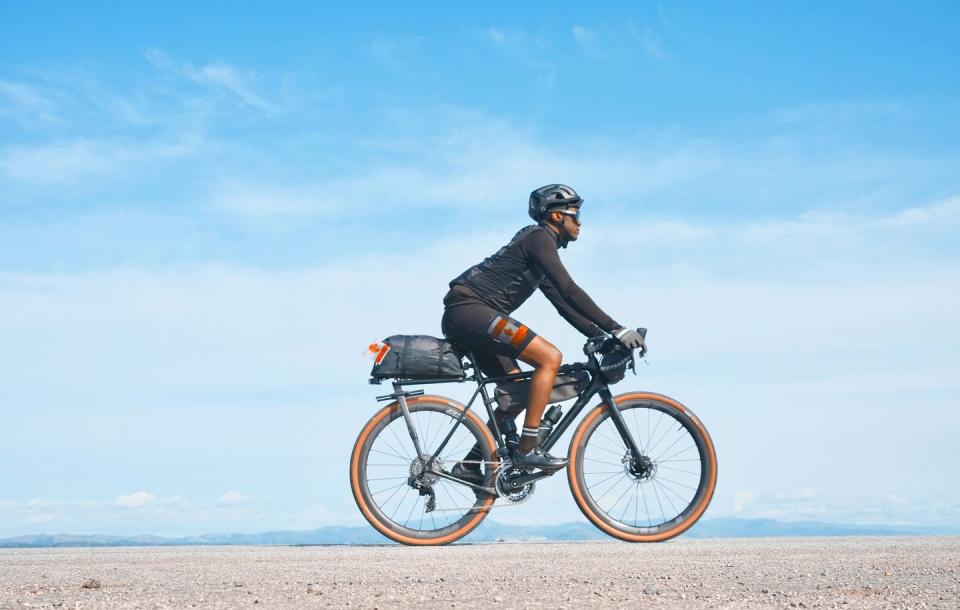
“When I realized I was getting a lot of attention as a cyclist, I wanted to use that attention, and that led me to working with World Bicycle Relief,” he says. “I ride for fun, for escape, for adventure. That’s a sort of privilege. In some communities, a bicycle is a literal and metaphorical vehicle towards opportunities. So if I can ride and share that attention with the World Bicycle Relief and raise money for them, that makes my trip more complete.”
His fundraising first began with his DJ career. “I have a big YouTube channel as a DJ, and back when I saw that it was growing really fast, I decided to use the airtime to raise funds for a United Nations organization, the World Food Programme, which gives meals to school children,” he says.
“If you’ve tried to go to school on an empty stomach, you’re just wasting your time. And that charity also found that parents were more likely to send their kids to school just so they could eat—education was a byproduct,” JaBig explains. “I’m big on education. I know I won the lottery. I was born into a family with well-educated African parents who were able to give us the best opportunities. I’ve been to some of the best schools in my life, and it’s not because I’m better, it’s just because of opportunities. And so for me, I see it as not a personal responsibility, but as a duty to hold the door open for others. And education is one of the ways to open opportunities.”
World Bicycle Relief was a natural evolution for JaBig. “When I got into cycling, I wanted a charity that focused on bikes,” he says. “World Bicycle Relief stood out because they really understood the problem and the solutions. I realized that if you want to take a bike and give it to somebody in a continent away, once that bike breaks down, it just becomes unusable. You also need to send the parts for it. But World Bicycle Relief actually sends their parts to the destination countries, and then they create a job for a local mechanic who builds and services the bikes. They’re keeping the bikes working, and they’re creating jobs. And the recipients of the bikes don’t just get a bicycle, they have to pledge to keep their grades up, not get into trouble, things like that, and eventually, the bike becomes theirs. That’s a dignified way of doing things.”
He also appreciated that World Bicycle Relief had good reviews on Charity Navigator, and use the offices at SRAM (the company that started the nonprofit) rather than owning a pricey headquarters. Many of the staff work remotely to keep costs down, which means more of the money JaBig raises—to date, more than $20,000—goes straight to the program, not the overhead.
“Once I found World Bicycle Relief, I decided to dedicate all my cycling efforts toward raising funds for them, empowering people through mobilization,” he says. “I came to Canada when I was in my early 20s. Even though I’ve lived most of my adult life outside my birth continent, I’m still attached to it. Africa is the place that gave me birth. And for me, I feel that it’s my duty to give back.”
A day in the life
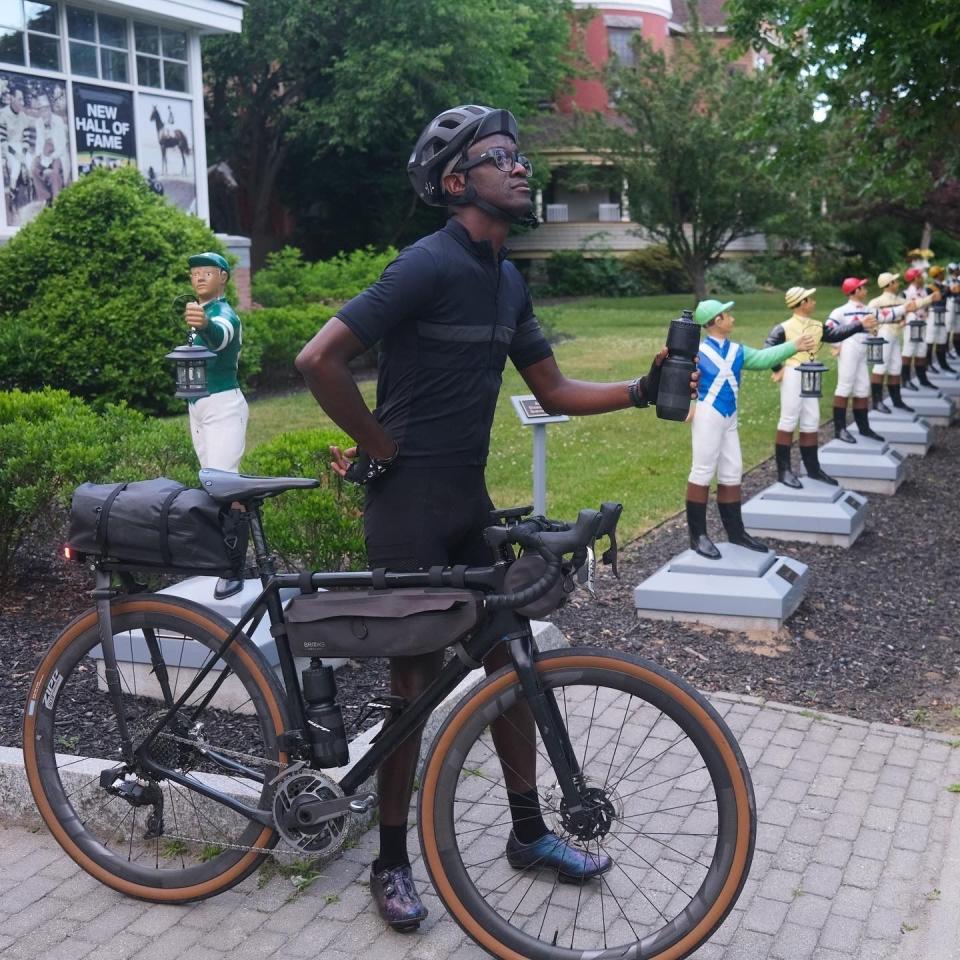
JaBig’s route around the United States started in Washington state on February 15 of this year and covered 8,236 miles before he finally closed the loop in Washington on August 2. He then headed north and returned to Vancouver, British Columbia, to start his recovery and get back to work.
It’s not a surprise that coming back to the ‘normal’ world feels a bit different after long rides, because every day on the road gets tightly packed with prep and pedaling. “On the road, I’d usually wake up at 4 a.m. in a panic, thinking that I overslept,” he recalls. “I’d force myself back to sleep, then wake up at six feeling exhausted. If I could get breakfast, I’d have breakfast, and if I couldn’t, I would ride and get breakfast along the way. But I’d ride all day, maybe stop for one meal but otherwise just keep snacking.”
His goal wasn’t to set any speed records—and he’s the first to say he likes to ride long, not fast—but that meant he couldn’t stop for big chunks of time or many days off if he was going to finish riding around the United States in under six months (the longest a Canadian can stay in the United States in a calendar year).
When he was done for the day, he’d finish at either a friend’s place—he met a lot of new friends and supporters along the way—or he’d use an app like WarmShowers to find friendly locals. After dinner (hopefully home-cooked, as gas station snacks started to wear on his stomach early on), he’d hang out with his friends, or their kids, post to social, and get to bed around midnight… to start all over a few hours later.
Why this DJ prefers no music on rides
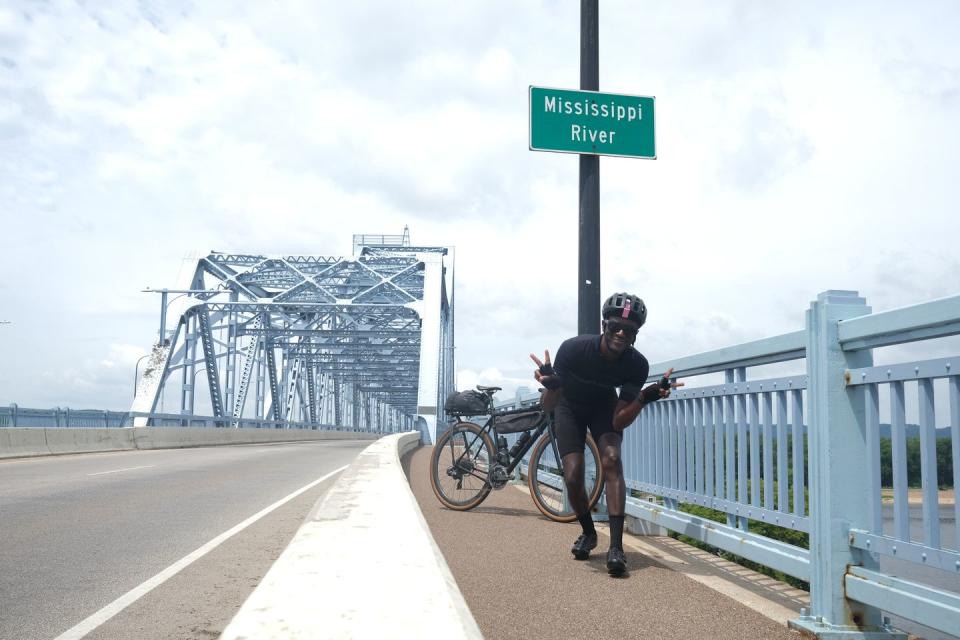
It comes as a bit of a shock, but this DJ rides in silence. “I get too distracted by music,” he admits. “I’m always picking it apart. That bass guitar riff: Is this sample? What does it remind me of? It’s a lot of mental work when I listen to music, and that makes me tired. On top of that, the whole purpose of being outdoors is to listen to what nature has to say,” he adds. “To me, listening to music when I ride is like going to the top of the mountain where you want to be by yourself, and then being on your iPad.”
It’s also a safety measure. “I need to hear if a car is coming behind me, and I can hear if it’s acting funny,” he says, relating a few harrowing incidents of being run off the road by overly aggressive pickup trucks. “And if some animal is coming toward me, I want to be able to say my prayers because I heard it coming.” (Moose and bears have been the biggest animals he’s encountered, though he adds that domesticated dogs have been the most aggressive. And the less said about the tiny alligator he almost peed on off the side of the road in Louisiana, the better.)
And lastly, perhaps most importantly, riding with headphones in is illegal in some places—it’s rarely enforced, but for a Black man riding alone, JaBig unfortunately knows that that could change anytime. “As a Black man, there’s just one rule: the less opportunities you have for law enforcement to interact with you, the less likely things are to escalate,” he says. “You don’t want to give them a reason to pull you over, because that would be a legitimate reason. And then from there, I think things tend to escalate. Most of the things start with a random stop.”
He relates one incident from 2016: “In Canada, I was pulled over because a policeman told me that people were saying that I was on the highway. I was, because bikes are allowed on that highway. He told me, ‘I still have to pull you over because people complained.’ Which doesn’t make sense, but that led to him starting to ask, ‘Where are you from? Do you have ID?’ But the thing was, I’m legally allowed to be on this highway, and I don’t have any obligation to share that information.”
Eventually, the situation de-escalated when JaBig told the Ontario officer he was from Quebec (Canadian politics, don’t ask!) but the story has stuck with him, and he knows that things could have gone worse.
What’s next for this DJ turned cyclist
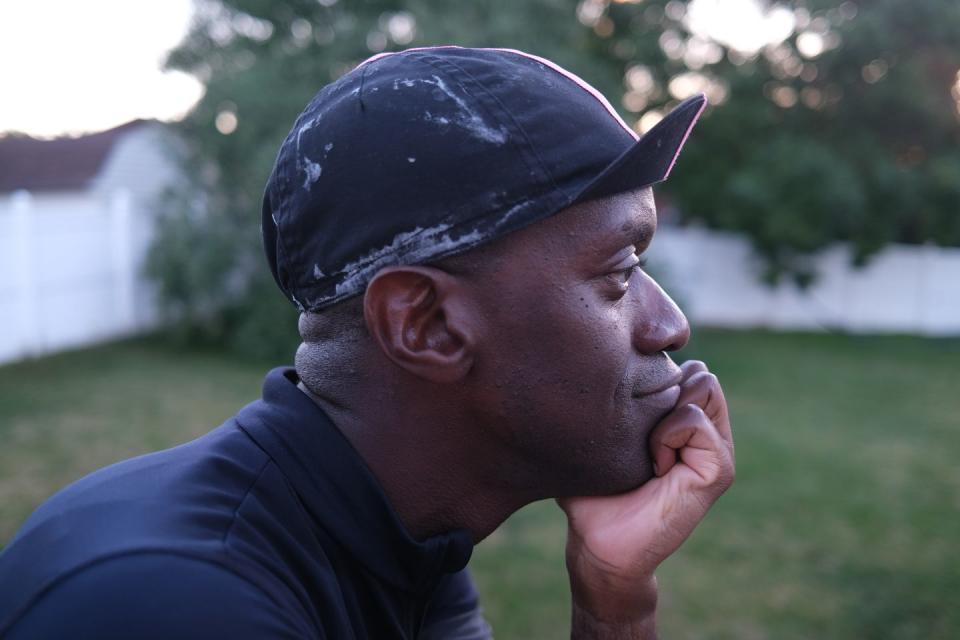
How does someone keep topping big adventures—like his Canada trip that touched the Atlantic, Pacific, and Arctic oceans and his 2022 U.S. trip that covered 8,000 miles—and to what end? That’s what JaBig is trying to figure out now, especially now that his platform has grown and more people are aware of his mission to share World Bicycle Relief’s message.
“I’ve been on big adventures. I’ve risked my body, my health to do them. This is what I love. But I’m out of balance,” he says. “I should take the moment to acknowledge that I’ve done something pretty major, but I’m also thinking about what to do next.”
He’s also hoping to be able to raise and personally donate significantly more money to World Bicycle Relief in coming years—and he hopes to see e-bikes make their way into the program. “More people could have so much more access with e-bikes versus regular bicycles,” he says. “The terrain can be so gravely and hilly there, and that can be challenging for people. Some people need to carry heavy things between places to bring to work. For e-bikes, there are logistical challenges there with the power grid, but I think it can be solved with things like solar power. I want to see more and more people become empowered.”
In the meantime JaBig plans to head back to Africa this fall to help a few friends from Vancouver run a gravel safari in Kenya. “They’re from Kenya and I grew up there,” he says, “They want to start a gravel safari company, taking people around the world on gravel tours in these national parks that they tell me are without predators. I joked with them that they’ve only invited me along because I’m the slowest and would be the first to get chased down by a lion or something. But that might be my next adventure: tour operator in Kenya.”
To support DJ JaBig’s efforts, donate to his World Bicycle Relief fund.
You Might Also Like

